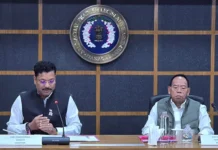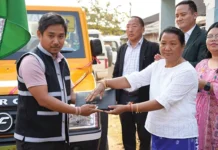DIYUN, 25 Nov: The Changlang district administration, in collaboration with the India Foundation for Education Transformation (IFET) launched a ‘School transformation and foundational literacy and numeracy (FLN) programme’ here recently to address the grassroots foundational educational deficiencies among primary and upper primary government schoolchildren of the district.
This initiative is in line with the education ministry’s larger mission to address FLN deficiencies among schoolchildren across the nation.
As many as 30 government primary schools in Changlang district are set to be covered under the programme this year. In the following years, the programme will be implemented in all the government primary and upper primary schools of the district.
DC Dr Devansh Yadav held an ‘orientation-cum-training programme on imparting FLN’ with the government primary and middle school authorities and teachers, including the SMCs. The DC identified several areas which need improvement, so as to ensure the realization of the FLN goals.
“There is a need to be flexible and be ready to collaborate in imparting education, adopt best practices, ways and means of imparting foundational education, so that learning takes place in children in the age group of 3 to 9 years,” he said.
Apprising the various FLN education stakeholders of the importance of the FLN programme, IFET CEO Prahlad C said, “Foundational learning has been a perennial drawback in government schools in the district and the annual ASER report by education non-profit Pratham has showed how, for successive years, a large chunk of government school students at the elementary level cannot even read, understand and do basic arithmetic in Changlang district. According to ASER 2018, in Changlang district, 72.3 percent of students from Class 3 to 5 cannot read Level 2 text, while 51.3 percent of students cannot do simple subtraction.”
He stressed on the need for “school transformation to realize the FLN goals, mission and vision,” and informed about the IFET’s collaboration with other NGOs to provide teaching-learning materials to schools, and about its initiatives and training programmes to effectively address FLN deficiencies among the children of the district.
The indispensability of FLN education to ensure a secure future for the children of the district was also underlined.
The attendee grassroots FLN education stakeholders included GBs, members of SMCs, community leaders, and representatives of NGOs.


